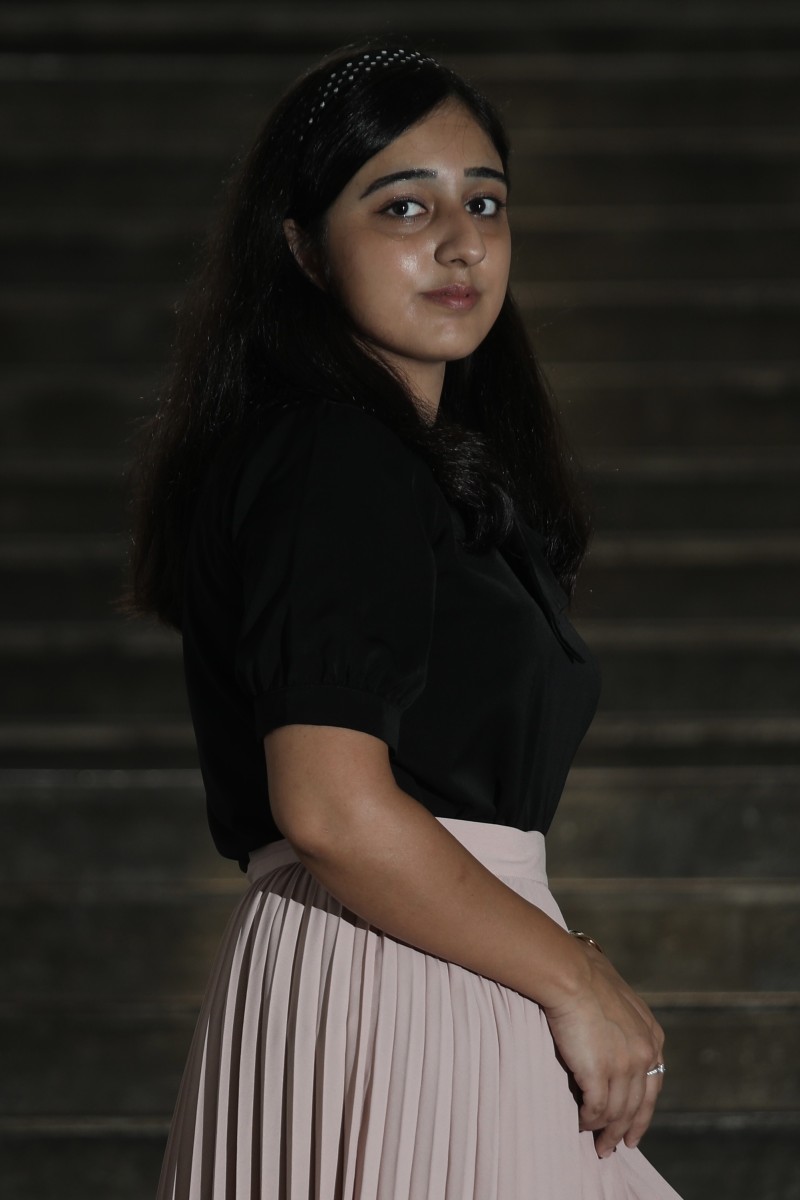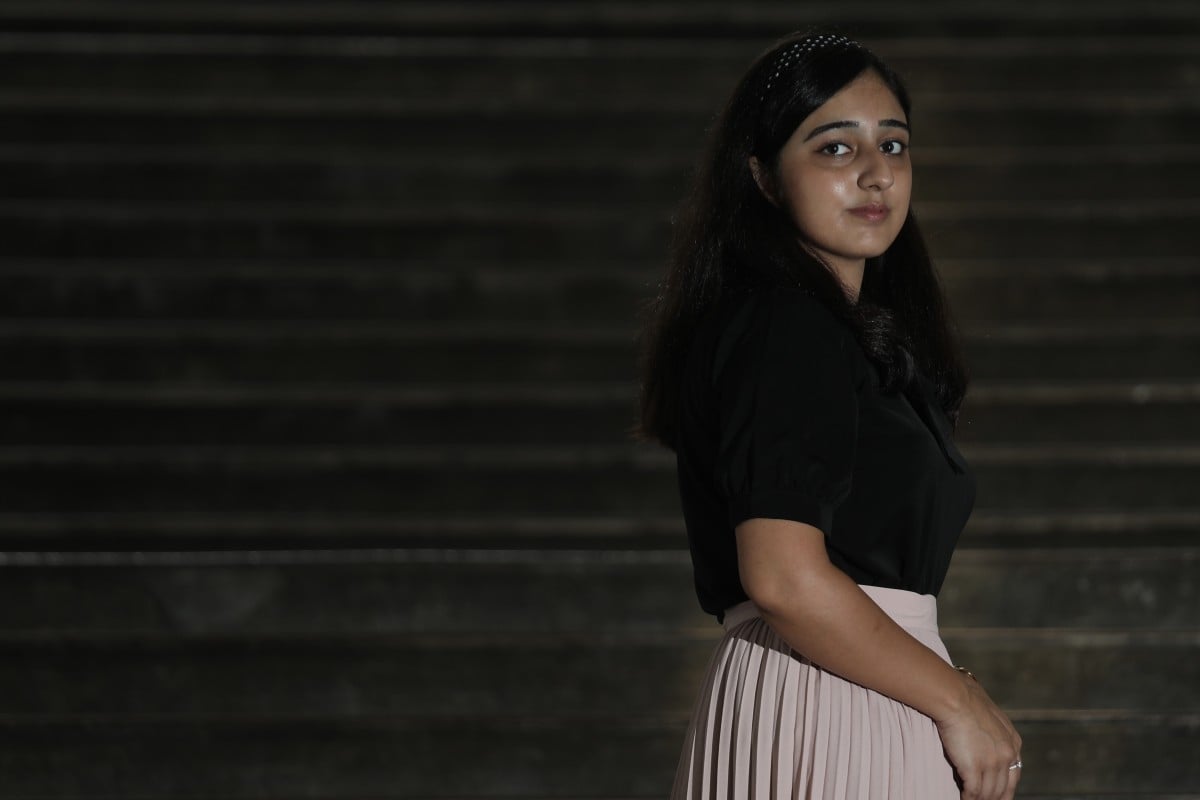
Pakistani engineer overcame racism, sexism, language barrier in Hong Kong to succeed in STEM
- Rabia Aslam moved to the city with her family in 2014, learned Chinese in less than a year, and fought through discrimination
- The CityU graduate is now working to help others in the ethnic minority community, especially women, through community work, advocacy, and creating online resources
 Aslam has experienced the effects of discrimination, and she is working on an online platform, named ‘EMblaze’, to provide important resources in different languages for ethnic minority groups. Photo: SCMP / Xiaomei Chen
Aslam has experienced the effects of discrimination, and she is working on an online platform, named ‘EMblaze’, to provide important resources in different languages for ethnic minority groups. Photo: SCMP / Xiaomei ChenRabia Aslam still remembers how she felt when she walked into her university’s orientation for biomedical engineering students four years ago.
The Pakistan-born 24-year-old recalled looking around at the faces of her classmates, wondering how many would come from ethnic minority backgrounds like herself. To her surprise, she was the only local student who was not Chinese, and the men in the class far outnumbered the women.
“I felt shocked and sad,” she recalled.
It was not the first shock Aslam had experienced as a member of an ethnic minority group in Hong Kong, where she faced outright racism and the insidious discrimination of diminished expectations. These difficulties, she found, were only made worse by her gender and her status as a newcomer to the city, making her success in a STEM field all the more remarkable – and something she now hopes to help other young girls replicate.
University of Hong Kong student merges art and activism
Culture shock in Hong Kong
Born and raised in Lahore, Aslam came to Hong Kong with her parents and her younger brother and sister in 2014 after her father, a businessman, landed a job in the city.
She recalled being so overwhelmed by the new environment that it took her more than a year to get over the culture shock. She had spent two months taking Mandarin lessons from a tutor before she left for Hong Kong, only to find most in the city spoke Cantonese.
Unable to speak the local language, she was rejected by the city’s top schools, and was admitted as a Form Four student in a school specifically for members of ethnic minority groups.
Discrimination in daily life added to her frustration, she said. People on the MTR would walk away from her, or cover their faces with a tissue as if to fend off a stench, she said.
Muslim student in Hong Kong allegedly barred from wearing headscarf
On her first day at the Delia Memorial School (Hip Wo) in Kwun Tong, where she attended classes with students from Pakistani, Indian and Nepalese backgrounds, among others, she was told by teachers and classmates that it was impossible for her to enter university because she was non-Chinese and did not speak Cantonese.
The news was disheartening, to say the least. Her family valued education, Aslam said, and having been a top student back in Pakistan, she was determined to follow the footsteps of her grandfathers and two uncles in becoming an engineer.
She pulled herself together
After crying for weeks, she pulled herself together and set her mind to beating the odds. She always finished her school assignments ahead of the deadline so she could ask her teachers for more. When her classmates were taking breaks between classes and playing after school, she was studying for the Diploma of Secondary Education (DSE) university entrance exam. She even stayed at school until 8pm every night studying Chinese.
After less than a year of study, she scored a B on the General Certificate of Secondary Education Chinese exam – an alternative to the DSE version – and made it into the top Chinese language class in her school.
Top ethnic minority student smashes through stereotypes in her HKDSE results
To learn more about Hong Kong in preparation for the liberal studies exam, she read local newspapers and picked one article a week to write a commentary about.
“I didn’t want to just run away from the hardships,” she said, choosing instead to run towards her goal. “Just keep running, and you will reach the finishing line.”
Her hard work paid off. She was admitted to the bachelor’s programme in biomedical engineering at City University of Hong Kong in 2017. She graduated in June, and landed a job as a research and development assistant at Koln 3D, a Hong Kong-based tech start-up that uses 3D printing to tailor-make artificial body implants for patients.
Aslam was determined to follow the footsteps of other engineers in her family, and she graduated this year from CityU with a major in biomedical engineering. Photo: SCMP / Xiaomei Chen
Looking back at her past experiences, Aslam said her path was not an easy one, and that she felt the need to do something to make a difference for others like her.
“It was a very difficult and challenging, yet remarkable and rewarding journey that helped me grow as a person and open new doors of curiosities and opportunities to me,” she said.
Education is key for ethnic minority students
She said that students from ethnic minority communities had the same ability as their Chinese peers to succeed in STEM – a term for the disciplines of science, technology, engineering and mathematics – adding that the potential for growth in the field was huge.
But, she continued, there was a lack of support for them from the government, schools and teachers.
Government figures show some ethnic minority groups lag behind when it comes to postsecondary educational attainment. Among Pakistanis aged 15 and older, for instance, only 21 per cent have some postsecondary education, compared to 33 per cent of the overall population in that age group. Of the ethnic minority students who do pursue postsecondary education, only 7 per cent study pure science.
Ethnic minority students in Hong Kong suffer at school and work due to prejudice, language
Meanwhile, some students from ethnic minority families even struggle to find support in their own households. Some minority parents did not encourage their children to pursue STEM education, regarding a career in business or finance as more secure, she said.
What’s more, a stubborn cultural tendency to place a higher value on men than women has led to gender inequality in STEM, Aslam added.
Number of forced marriages in HK ethnic minority community increases due to Covid-19
Indeed, official figures reflect a major gender gap across disciplines when it comes to ethnic minority communities, with the proportion of men who pursue postsecondary education roughly twice that of women.
When she was new to Hong Kong, Aslam said she had been inspired to see female bus drivers and construction workers – jobs that were regarded as strictly for men in Pakistan, where most women were housewives.
“This mentality is still strong among the city’s ethnic minorities. We need to change that,” she said. “Education is key for ethnic minority members to climb up the social ladder.”
Giving back to her community
Aslam now takes part in various kinds of community work for ethnic minority groups, and has spoken at three public hearings at the city’s Legislative Council on related issues. She also took part in a consultation with the chief secretary in preparation for the city leader’s 2019 policy address to highlight the educational issues faced by newly arrived members of ethnic minority groups in Hong Kong.
She is also currently working on an online platform, named “EMblaze”, aimed at providing information on topics such as the vaccination programme and housing applications in different languages and audiovisual formats for ethnic minority community members. She is also posting documentaries highlighting the achievements of the city’s ethnic minority residents to inspire others.
Opinion: Young people aren’t just the leaders of tomorrow – they’re today’s changemakers, too
She will begin studying part-time for a master’s of science in biotechnology at the Hong Kong University of Science and Technology in September, and plans to pursue PhD studies later.
Aslam said she aspires to work in health care, and especially on making health care more affordable for women in developing countries.
“So many ups and downs, and hurdles were part of my journey, but constant hard work, persistence and resilience helped me to positively overcome all of them,” she said.